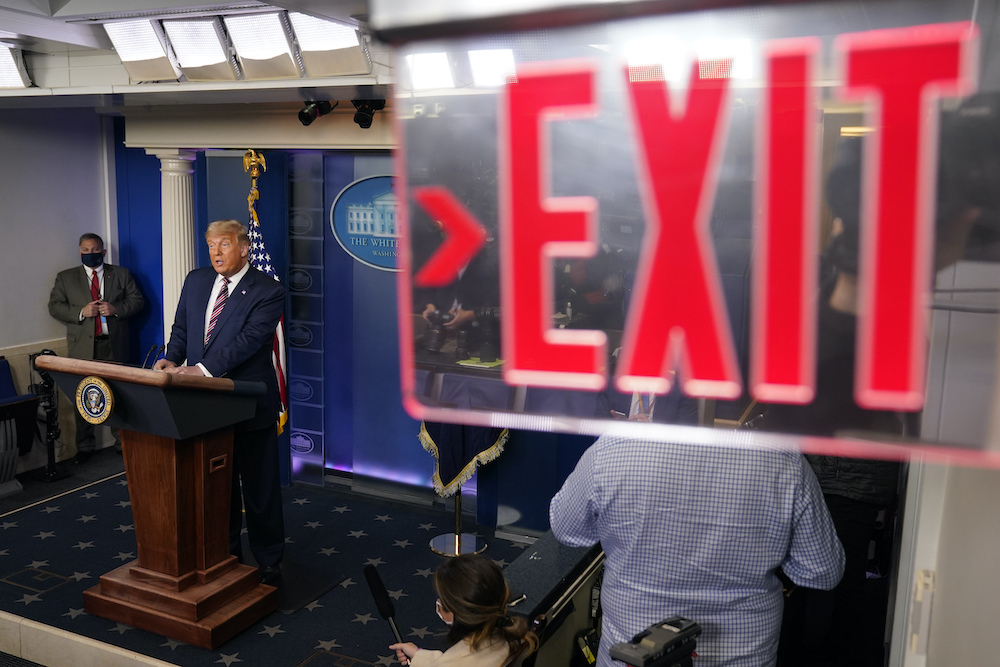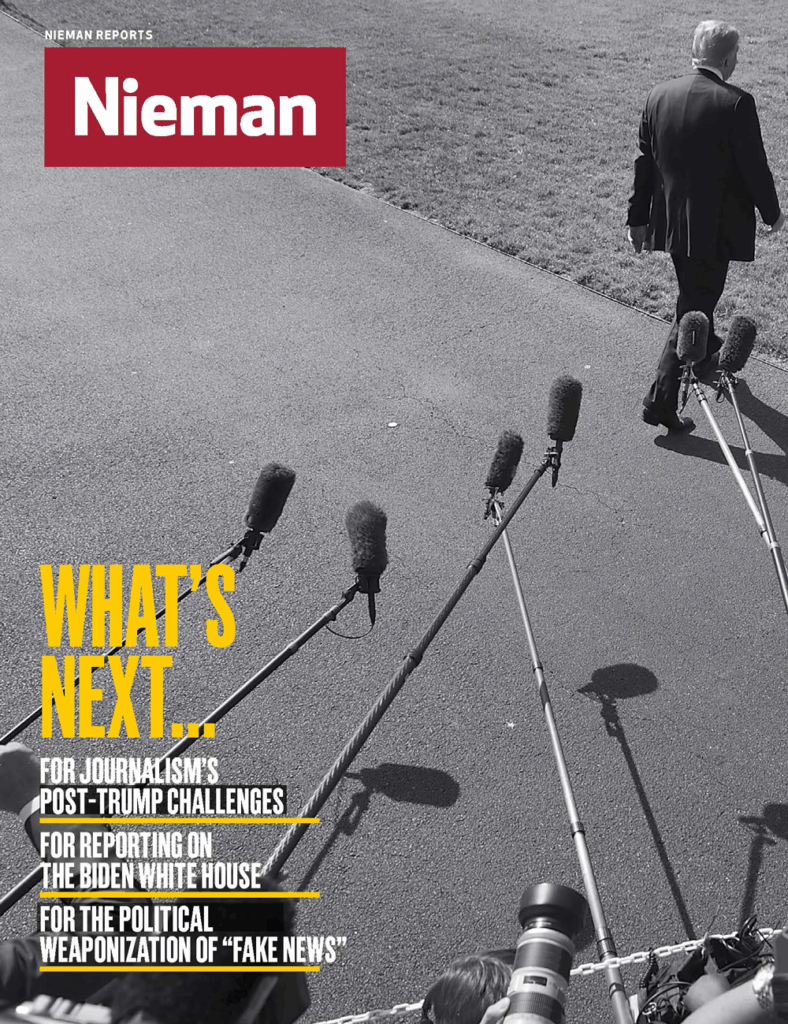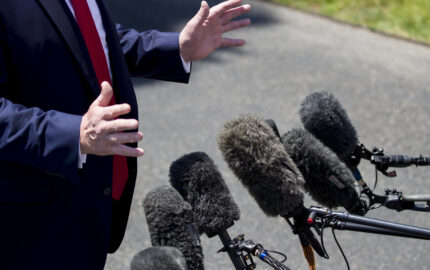For the four years President Donald Trump was in office, political journalists covered an administration that repeatedly attacked the press, calling them the “enemy of the people,” and which repeatedly lied, most recently about a deadly virus ravaging the nation and about the election that handed victory to now President-elect Joe Biden — results Trump has falsely claimed are the result of fraud.
Now Trump is on the way out, and the press finds itself preparing to cover what is likely to be a — comparatively — bland Biden administration. Though journalists will still be covering a time of intense tumult — Covid-19 cases spreading like wildfire, an economy in freefall, an ongoing reckoning over racial injustice — for the first time in four years, the president will not be a wildly erratic figure who is also a documented serial liar.
But it’s not as though the political press will flip a switch and revert to the pre-Trump era — this unusual administration has left its mark. Elisabeth Bumiller, assistant managing editor and Washington bureau chief at The New York Times, notes the considerable volume of misinformation coming from the Trump administration transformed a more credulous pre-existing dynamic of political coverage.
“In the old days, it was much more of a ‘Republicans said this today, but Democrats countered with that,’ and Trump changed all that,” says Bumiller. “We have a formulation now with Trump of, ‘The president falsely said.’ Occasionally we have said, ‘The president lied.’ We have changed our approach so that we determine the best we can what the actual truth is and then say it, as opposed to doing this both sides thing, and I think that will continue now.”
It’s not as though the political press will flip a switch and revert to the pre-Trump era
Of course, it’s too early to know what covering a Biden administration will be like, but if the presidential debates are anything to go by, there will likely be fewer outright falsehoods, misleading statements, and exaggerations to parse. “Politicians distort, they exaggerate, but nothing like Trump, so I think we may go back to something we’re more used to,” says Bumiller. “But I do think there will be an effort for us to determine what the reality is based on our reporting. I think both-siderism was dying anyway, before Trump.”
Nathan McDermott, political reporter for CNN’s KFile, predicts the dynamic of “mutual deference and respect” between politicians and political reporters ended with the Trump era: “It’s a bit naive to think the world will return to that again. I think political reporters have become a lot more understanding of bad faith actors and people who not only lie but lie to reporters to try to get their message out … I think we’re up to the task, I just think we need to resist the idea that things are going to be just like they were before Trump.”
The reasons for this extend beyond shifting attitudes within the press corps. For one, the misinformation borne of Trumpism, now rampant on social media, isn’t going anywhere. For another, Trump’s influence on the Republican party will not wither away when he exits the White House. “I think with Trumpism out of the box, he’s really energized a lot of Republicans,” says McDermott. “There’s definitely going to be a lot of Trump acolytes and followers who will pursue office because they’ve been inspired by him, and they like his message.”
This has already happened. Far-right media figure and self-described “proud Islamophobe” Laura Loomer ran this election for Congress in Florida’s 21st District with the vocal support of President Trump — she lost to Democratic congresswoman Lois Frankel, but garnered 39.2% of the vote.
Kadia Goba, politics reporter who covered the Trump administration for BuzzFeed News — and recently announced she will be going to Axios — says before going on the campaign trail this election season, she thought the Republican party might become more centrist in its leanings “to appeal to a broader community.” Her repeated attendance at Trump rallies shifted her perspective: “You get the sentiment people are leaning more and more right.” When I spoke to her a few days before the election, she pointed to Loomer’s run in Florida, and QAnon conspiracy theorist Marjorie Taylor Greene running for Congress in Georgia. (She went on to win.)
“There are people who support QAnon that are at the doors of Congress right now,” Goba says. “I thought the tactical response for Republicans would be, ‘Why don’t we go a little more centrist and try to work with the Democrats on some kind of legislation, so we’re not deadlocked?’ But there seems to be an appetite for extremism here.”
Outlets will have to make editorial (and ethical) judgments about how to cover Trump moving forward, if at all. At the very least, hanging on his every word will no longer be necessary. “I don't think what he says is relevant unless it has a real impact on the world — and that may be less and less true,” says media columnist Ben Smith of The New York Times. “Often picking a fight with the press is the point, and you don’t have to engage.”
Still, it seems unlikely Trump himself — or his influence — will disappear in a Biden presidency. Republican leaders, far from repudiating Trump have continued to demonstrate their loyalty, backing the president’s refusal to concede the election. Rick Klein, political director of ABC News, said in a pre-election interview that “win or lose, Trump isn’t going anywhere. I think there will be candidates for 2024 and congressional candidates and members of Congress who will learn different lessons from Trump. There will be some who mimic the policy divisions and the style, and others who take the opposite lessons and say, ‘We need to change what the party stands for and reclaim it.’”
Divisions on the left will continue to deepen as well — those divisions were not front and center in the months leading up to the election because the emphasis was on defeating Trump and managing national crises. “The whole run-up to the [Democratic National] Convention, which normally would have been left versus center and ‘What’s the party’s platform look like’ was just consumed by the coronavirus and the economic collapse and the racial reckoning,” says Klein. As Biden ascends to the presidency, efforts by the party’s more progressive wing to push the president-elect left will resume.
“Embrace the uncertainty,” says Klein. “I can’t presume to know who the future leaders of the Democratic party or the Republican party are. If you rewound to the aftermath of Clinton’s loss four years ago, AOC hadn’t run for office yet, no one had heard of her. I think most people presumed Joe Biden was well into political retirement and was not coming back.”
Exiting the Trump era poses some existential as well as practical questions for news outlets. During the Trump presidency, outlets were forced to match a hostile administration with a new level of scrutiny, vigilance, and aggressive debunking. Now they will have to make decisions about covering a Biden administration. Will they take a similarly aggressive stance? Will they take it as an opportunity to showcase their neutrality?
Outlets will have to make editorial (and ethical) judgments about how to cover Trump moving forward, if at all
“I do think that the mainstream press has been very defensive in recent years about being called part of the Democratic apparatus,” says Margaret Sullivan, media columnist for The Washington Post and previously the public editor of The New York Times. “Journalists want to be seen as independent, so when they’re accused of being part of the political system spewing talking points for the DNC and so on, they become even more careful about not looking like they’re biased in any way, and that can sometimes play out as letting official sources get away with too much … I don’t know how it’s going to sort of translate [to the Biden administration], but it’s also hard to believe that it’s going to quickly go back to the way it was before.”
Cable news networks will also have to make determinations about tone moving forward. For Fox, the answer may be more straightforward — after all, after eight years of criticizing Obama they “transitioned into non-stop praising Trump, feeding him ideas,” observes media analyst Rick Edmonds of Poynter. “I think they may need to get a new act, though presumably they’ll have plenty to complain about with a Democratic administration.”
Cable networks more left-leaning than Fox may have a more complex reckoning with regards to tone, however. “In some ways I think it’s a little harder for MSNBC particularly — and CNN to an extent — that you can’t be in relentless opposition with the person you’re opposing, who isn’t there anymore,” says Edmonds. “Many more people watch the network evening news, which is more down the middle of the road, but the cable networks are really contributors to hyper partisanship and it will be interesting to see if there is any soul searching and kind of course adjustment.”
Then there is the existential and practical matter of subscriptions and viewership. Outlets have enjoyed a “Trump bump” over the last four years as record numbers of media consumers have shown an increased interest in staying informed. The New York Times Company saw its income double during the third quarter of 2020, raking in a whopping 7 million subscribers. Will a slump necessarily follow?
“I think the question of whether people will be as deeply involved in news coverage, whether new consumers will be as interested as they have been during a four-year crisis of democracy — it seems unlikely they’ll be as glued to national politics as they have been,” says Sullivan. “But I don’t know that any particular kind of coverage of the Biden administration will change. Trump called himself a ratings machine, and in many ways he was — he knew how to command attention, he will continue to command attention. That I think is a more likely scenario: that people will stay tuned because he’s not going to leave the stage.”
Bumiller suspects Times readers will stay tuned in, whether for political coverage or the paper’s other offerings. “There’s a lot of interest in Biden now, and we think that will continue into the year,” says Bumiller. She also observes that many Times readers were attracted to non-political pieces — about arts, travel, culture, food, and music. “The Times has also been aware for years of the ‘Trump Bump’ as we called it, but it turns out people have stayed with the Times and have read things beyond Trump coverage.”
And while it seems unlikely Trump’s time in the spotlight will fade away anytime soon, outlets will ultimately have to make determinations about how, when, and to what extent he should continue to be covered. It certainly shouldn’t be done for the sake of ratings, argues Sullivan, but “If it’s truly newsworthy, then yes, it makes sense to cover it to a certain point.”




